- Home
- Allan Topol
A Woman of Valor Page 2
A Woman of Valor Read online
Page 2
Philip begged her to move into his apartment, but she consistently refused, determined to maintain her independence.
It seemed strange to Leora later, but one subject that she and Philip never talked about was religion. Even though they were both Jewish, Philip was British and she was Egyptian, and that was that. Once, Joan Whitney, who wanted a source book Leora had borrowed from the library, sneered at her and called her a "Jewish whore." Leora told Philip about it later, but he laughed it off.
"Don't think anything of it," he said.
But she refused to forget it. When the book was due two days later, Joan came around to Leora's room looking for it. She shoved it under a small ledge above the curtains and told Joan, "Don't know where it is."
Philip was finishing his third year in school that spring, and he began talking to Leora about marriage. Each time he did, she turned him down, telling him that she was much too young for that. She wasn't prepared to tie herself down.
It wasn't that she didn't like Philip. It was just that Leora was beginning to dream about being an actress. All those dreams would go down the drain if she married. Children would soon follow, Leora thought, and that would be the end of her dreams.
* * *
London is very far from Alexandria. Just how far, Leora realized in the summer of 1956, when she returned home. Abba wanted her to work in his office, but she enlisted her mother's help to nag him into a one-year dispensation. The family belonged to a swim club in Alexandria, and Leora spent most of the summer lounging at the pool reading books about the theater.
One of the nicest things that happened to her that summer was discovering the private library about the theater that Abdel Rasef, Abba's lawyer, had in his house. He gave her complete access. Sometimes in the evening, Rasef brought her a cup of coffee and joined her in the library to talk about the theater. He called her "Le-le-le." She could sense the lust in his eyes. Sometimes trembling with excitement, she waited for him to take her in his arms, not certain how she would respond. He never did.
By September, she was grateful to return to the civilization of London.
* * *
Leora was happy to pick up with Philip again. He was entering his last year at the university, and she knew that he would be pressing her about marriage.
All in all, London in October 1956 was nearly perfect for Leora. Then the war came—the lightning blitzkrieg that the Israelis called the Sinai Campaign, the last dying embers of the grandeur of empire that the British called the Suez War.
Where is it written, Leora wondered much later, that a storm must follow every calm period? And when, oh, when, will the tranquility return?
Chapter 3
"Anthony Eden must go!" The shouting voices filled the chilly night air in Hyde Park. "Down with Eden, the warmonger!"
The protesters covered the grass in the park, waving signs high over their heads. They were young mostly, college students, but there were others too: the local Communist party was out in droves. They had been having a field day ever since the British public had learned that England collaborated with Israel and France in an attack on Egypt to seize the Suez Canal.
The British police, armed only with clubs, had a strategy for handling the protesters. They were prepared to concede supremacy to the shouting protesters inside of a defined area. A solid wall of black coats surrounded that area. Here and there protesters tried to break through the police line, yelling, "March on Downing Street! March on Downing Street!" The police drove back each forward thrust of the crowd.
At the edge of the park next to the Dorchester Hotel, Leora stood with Philip watching the protest in silence.
The gawky, long-legged youth had become a sensuous woman, and the long black hair had given way to a short cut of the type favored by students at the University of London. She was carrying a thick notebook, the script for her part as Lady Macbeth in the Drama Society production that had gone into rehearsal.
On another side, the protesters tried to break through the police line. Again they were driven back. Screams filled the air.
"Kill the fascist pigs!" Philip shouted through cupped hands.
Leora put her arm through his.
"I'm cold, Philip. Take me home."
"Just a few more minutes."
"Your radical politics are showing," she said, pulling the scarf around her face to keep warm.
"Damn right. Eden's a fool. The sooner he goes the better. What do you think about it?" he asked her. "You never say."
"I'm cold, Philip. I'm tired from rehearsal. Take me home."
* * *
When they were back in his apartment, she fixed two cups of tea. Philip quickly turned on the radio, listening for the late news.
"I love everything about this city except its climate," she said.
He turned off the radio.
"Eden's still not saying anything about withdrawal. They're trying to stiffen his backbone. That should be some job."
She sat in silence, sipping her tea.
"I haven't been able to get you to say anything about it. That in itself astonishes me. I've known you almost a year. You have an opinion about everything."
"What do you want me to say?"
"Want you to say? My God. It's almost funny. You're a Jew, an Egyptian, and living in England. Talk about divided loyalties."
She wondered whether to attach any significance to the order in which he listed her three loyalties.
"I'm apolitical," she answered, trying to sound casual.
"We're not talking about politics. We're talking about people. My father knows some British businessmen whom Nasser kicked out when he took over the Canal. Told them to leave on twelve hours' notice. What will happen to your family?"
She looked at him, so serious, so concerned. "Oh, Abba will manage to walk a tightrope," she said. "I'm not worried."
He was startled by her words. She sounded so cold, so detached. What he didn't know was that deep down she was terrified. She hadn't received a letter in three weeks, since October 27, two days before the attack.
"If I can do anything to help," he said. "If it's money you need..."
Maybe she hadn't been able to fool him at all. He knew her so well.
She stroked the top of his hand, gently. "No, silly, there's nothing you can do." An hour later when they finished making love, she lay in bed looking at the shadows on the ceiling. Philip was snoring softly. She got up and pulled a robe around her body. Her teeth were chattering.
Then she went into the living room and sat down in a bulky brown leather chair, next to the window, looking out but seeing nothing. She tried to muffle the sobs. But the large tears slid down her face. He found her in that chair in the morning.
Later in the day after classes, she went back to her own apartment to check the mailbox.
She saw the envelope sitting in her mailbox. She carried it up the stairs and tore it open. Immediately she recognized her mother's Arabic scrawl…
Dear Leora:
I have much to tell you that is not pleasant. The Israeli military success has caused bad feeling among our leaders in Cairo, including Colonel Nasser himself. Today, Abba found the doors to his office sealed by order of the government. All of our bank accounts have been taken over by the government, and we have been told that we must leave Egypt within twenty-four hours. It is not only us. Other Jews in Alexandria have been given the same order. There is some rioting in the streets and burning of Jewish shops. We are hiding in the house for now.
I do not know what we will do. Abba has gone into a trance since he heard the news, and Rachel, poor little Rachel, is sick and cries all day. Meantime, I am trying to make some plans for the family. I have just been told that there is a ship which will take us to Haifa. The Egyptian government will permit us to keep enough money to pay for one-way passage. I think that we will probably take that ship. I do not know what else we can do.
For now we have enough to eat and the trip should not be long, although I understand that we have to stop in Cyprus. Your brother Uri has checked the map and does not understand why this is so.
I must ask you to leave London at once and meet us in Haifa. As you know, I do not have your fathers strength. But he is of little help now, and I do not know how I will manage without you.
I realize now that we were foolish because we did not leave in 1948 when the others did, but Abba was so certain that it would never affect us. Still I am to blame too.
Uri has heard somewhere that in Israel the government takes care of everyone. I pray to God that will be the case. I do not know how Abba will start again.
May God bless you and help you find the way.
Love, Mama
Leora could hardly believe what she was reading in the letter. She choked back the tears, took a deep breath, and read it again.
This time there were no tears, only anger. She was angry at everyone—at Abba, who had been such a fool, at Nasser and the Arabs, at the world for permitting this injustice to occur. Without a coat, she bolted out of the door down the long staircase and put into the chilly midday air. She took a long walk around the neighborhood, trying to think about what she would do.
* * *
"You are the most stubborn and pigheaded creature I have ever known," Philip shouted in desperation.
"You didn't say that to me six months ago when we first made love."
He ignored her comment.
"I have told you every possible way. My father would be happy to bring your whole family to England and to support them until they get back on their feet. You could continue at school. You don't have to leave."
She still wasn't moved.
"It wouldn't involve any sacrifice on his part, honest to God."
She remained silent.
"Oh, for Christ's sake, he supports every other Jewish charity in London. Why won't you let him do it?"
"That's the whole point. I don't want your charity."
"Charity," he shouted in despair. "I'm in love with you."
She looked at him. He was so pitiful. Yes, he was in love with her. And he made it all sound so easy. All she had to do was marry him. He would bring them all to England.
She even loved him in kind of a way, she thought. But she could never bring herself to do it. There was such a thing as pride. It was something Abba had pounded into her from an early age. The world is divided into doers and takers. She would stand by herself.
"I will manage fine myself," she said coldly. Her voice had such a ring of finality that even Philip knew that further argument was useless.
That afternoon she withdrew the last two hundred pounds from her bank and closed the account. The following morning, she boarded BEA's flight 612 to Tel Aviv.
Chapter 4
Leora was never able to forget the first time she saw Abba in Israel. He was sitting alone on an old metal cot in the absorption center. All of the life, the color that she remembered, was gone. He was a beaten man, subdued, defeated. He gave her a weak greeting, nothing like the large bear hugs she had grown accustomed to.
His only words were: "I certainly managed to ruin our lives." Then he rested his head on the pillow, staring at the ceiling. With large tears flowing down her checks, Leora walked over and stood next to him. He stared at her without seeing anything. He was still thinking about what they had taken from him.
They remained like that for ten or fifteen minutes—father and daughter—until Hannah walked in.
"He's been that way since we left Alexandria. Now you see why I called for you."
* * *
Leora looked around the small two-room apartment in the absorption center. At least they were all safe and alive. They had shelter and enough food for the next six months.
She quickly realized that Hannah was unable to cope. Leora decided that she would have to get them on their feet again.
During the first few weeks she didn't give herself the luxury of forming any feelings about what had happened. There was too much to do.
It was Leora who drilled the younger children in Hebrew lessons when they were tired and frustrated from learning a new language that she herself found puzzling. It was Leora who persuaded her mother that the family could start again in new surroundings. And it was Leora who worked on Abba, day and night, attempting to persuade him that he was not too old to start again. That was her most frustrating task. Each time she felt she was making progress, she would be met with a new bout of depression on Abba's part.
But after the first few weeks, strong emotions began taking hold of Leora. She began feeling great waves of anger about the terrible injustice that had been done to them. With the anger came bitterness and hostility. She wanted desperately to get some revenge against those who had been responsible.
And late at night, long after the others were asleep, she lay in her bed pounding her fist into her open hand and vowing that vengeance would be hers one day.
As the end of the six-month period approached, it was Leora who persuaded the bureaucrat from the absorption center that Abba's background could make him a valuable asset to Zim Lines, the Israeli government's entrant in the burgeoning maritime industry. He was hired as an assistant clerk in the administrative branch. And, as for a place for them to live, she was able to obtain a favorable lease from the Jewish Agency on a house in Haifa not far from Abba's new job.
Leora waited until the family was settled into the house on King George Street before she told her parents what her own plans were. Sadly, she reflected on the fact that neither of them had even asked her what she would do. Both were so obsessed with their own individual problems.
She waited until Abba had survived his first week at work without quitting or being fired—a minor miracle in itself. Then she called Abba and Hannah into the living room of the house.
"I have decided to join the army," she said, simply and easily.
"God forbid!" her mother shouted. She looked at Abba, hoping for some encouragement. That hope Was forlorn.
He was totally preoccupied with his own problems. His indifference to her may not have been intentional. But it was indifference nevertheless.
"But that is for men," Hannah protested. "A tramp you'll become."
"And what should I do?"
"You will continue your studies."
Leora started to laugh. "Where and with what?"
"Tell her she can't do it," Hannah said feebly to Abba.
He remained silent, staring at Leora. He was barely able to handle the daily routine that Leora had arranged so carefully for him.
"Why, why would you do such a thing?" Hannah asked.
"You wouldn't understand, Mama. Really you wouldn't."
She didn't have to attempt the explanation. Hannah didn't press her. It was just as well. She wondered how she could express what she felt inside. All of the bitterness, the anger, and the hatred.
"I want to fight," she said to herself when she left the room.
"Oh, God, how I want to fight. Yes, to fight."
* * *
Later that evening, she sat down with a pen and paper, trying to compose a letter to Philip in London. She hadn't written to him since she had arrived.
She tried the letter three different times on three different pieces of paper. But each time she crumpled the piece of paper and fired it into a wastebasket. He could never understand, she decided. She wanted to write, and yet...
She reached a compromise. The following day she picked up a picture postcard at the newsstand—one with a picture of the Knesset in Jerusalem.
"Dear Philip," she wrote. "We have all been resettled in Israel. I hope that you are well. I am entering the army next week. Fondly, Leora."
She decided not to put a return address on the postcard. She wanted to burn every bridge to her past.
* * *
The army represented rebirth for Leora. It was the great melting pot of Israeli society in those days, taking new immigrants from a score of countries—France, India, Iraq—molding them into a single fighting force. No, more than that, it molded them into a nation.
Basic training was physical. It was outdoors in the desert. At last Leora was free from all of the hassles of family life. She could be her own person again. She enjoyed every minute of it.
Then there were the weapons. In her own mind Leora personalized those cardboard targets used at the range. They were the enemy, the miserable slime of life who had booted her family out of Alexandria, who had taken their home, who had taken Abba's business.
The officers could never understand why she always asked to spend extra time on the firing range, but she did, hour after hour. At first she thought it would relieve some of the anger and bitterness she felt, but it only strengthened these. There was one small fringe benefit, though. She was the first woman in the history of the Israeli army to achieve the award of marksman first class.
Two days after Leora received her medal, the telephone call came. It was her mother. She was frantic and in tears.
"Abba collapsed and was taken to the hospital."
* * *
"Don't coddle me," Leora said to the doctor. "I'm a big girl. I've been through a lot. How bad is he?"
The doctor looked at the girl's hardened face. She could take honesty. There was no question about that. Then he glanced at Hannah, standing terrified next to Leora.
"Don't worry about her," Leora said. "She'll never understand what you are saying in Hebrew. I'll translate it and soften it for her in Arabic."
"He's had a stroke that's quite serious. He'll never recover the use of the left side of his body."
"Is he in danger of death?"
"Not at this point, but the paralysis might spread."
The doctor looked for some show of emotion by the girl, but there was none. He left the room unobtrusively, permitting Leora to explain it to her mother.
When Hannah finally grasped it, the first question she asked was "How will we live?"
"I will leave the army and take a job," Leora said. "They have a policy of discharging those who are the sole support of a household. I'll be able to qualify."

 Conspiracy
Conspiracy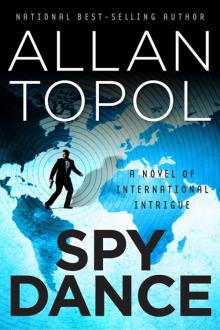 Spy Dance
Spy Dance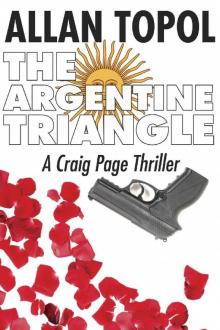 The Argentine Triangle: A Craig Page Thriller
The Argentine Triangle: A Craig Page Thriller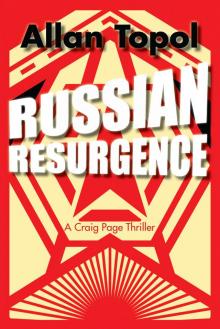 Russian Resurgence
Russian Resurgence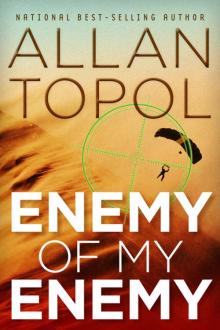 Enemy of My Enemy
Enemy of My Enemy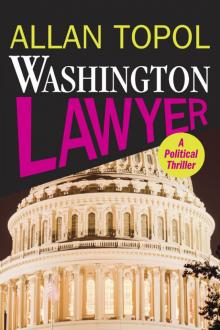 The Washington Lawyer
The Washington Lawyer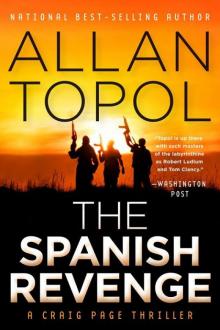 THE SPANISH REVENGE (Craig Page series)
THE SPANISH REVENGE (Craig Page series) The Italian Divide
The Italian Divide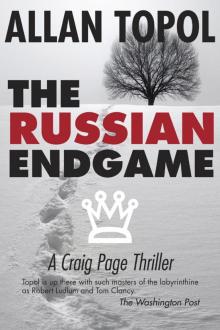 The Russian Endgame
The Russian Endgame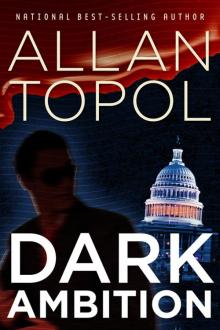 Dark Ambition
Dark Ambition